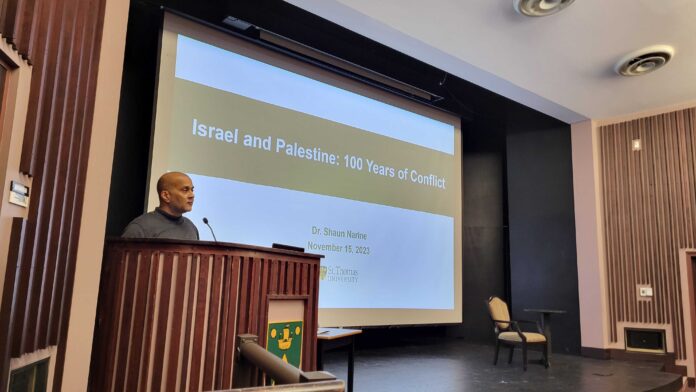
International relations professor Shaun Narine delivered a lecture on the history and current events between Israel and Palestine on Nov. 15 in Edmund Casey Hall at St. Thomas University.
Since the escalation of the conflict on Oct. 7, Narine said he wanted to bring some historical context and insight to the current conflict including the viability of a solution.
Narine said Israel’s historical settlement growth in the West Bank have “ruined” any chance for a two-state resolution. He added it is the result of Israel’s colonial past, as he said the state was formed by Europeans on Indigenous land.
“A two-state solution is no longer viable … there are too many Israeli settlements in the occupied territories. Getting them out would not be impossible, but trying to do that could easily lead to an Israeli civil war,” he said. “With 700,000 settlers in the West Bank, that land is not going anywhere. It’s essentially permanently occupied.”
Related: Explainer: What is happening in Israel and Palestine?
However, he said that a one-state solution would be like putting “two scorpions in a bottle.”
According to Narine, Israeli settlements in the West Bank are illegal under international law and were done on their own accord.
“The decision to build illegal settlements is entirely an Israeli one, it literally has nothing to do with the Palestinians.”
Narine calls attention to the Hamas attack on Israeli civilians as a tragedy, but reasserts that the response by the Israeli state is disproportionate, adding that if Israel had any moral high ground, they have “lost it now.”
“Both sides, I think, may have genocidal intentions. Who is the only one that actually has the power to act on those intentions? That’s a big problem.”
The lecture was attended by more than 30 students and faculty. To first-year student Alex Ryan, understanding the context of the conflict is very important.
“I felt that it was definitely important to have more context to understand what led up to the Oct. 7 Hamas attack. There’s a lot more context than people realize,” said Ryan.
Ryan believes that it is important to hear voices from both sides of the conflict in order to have a full understanding. He said he has been trying his best to understand the history.
Narine thinks although the world may have been shocked by the Oct. 7 attacks, many people understand the context and believe there is no chance for a two-state solution.
“Most observers today think that the two-state solution is dead.”
Related: ‘It’s horrific’: Pro-Palestine vigil calls for violence to end after weekend of attacks
With files from Giuliana Grillo de Lambarri
